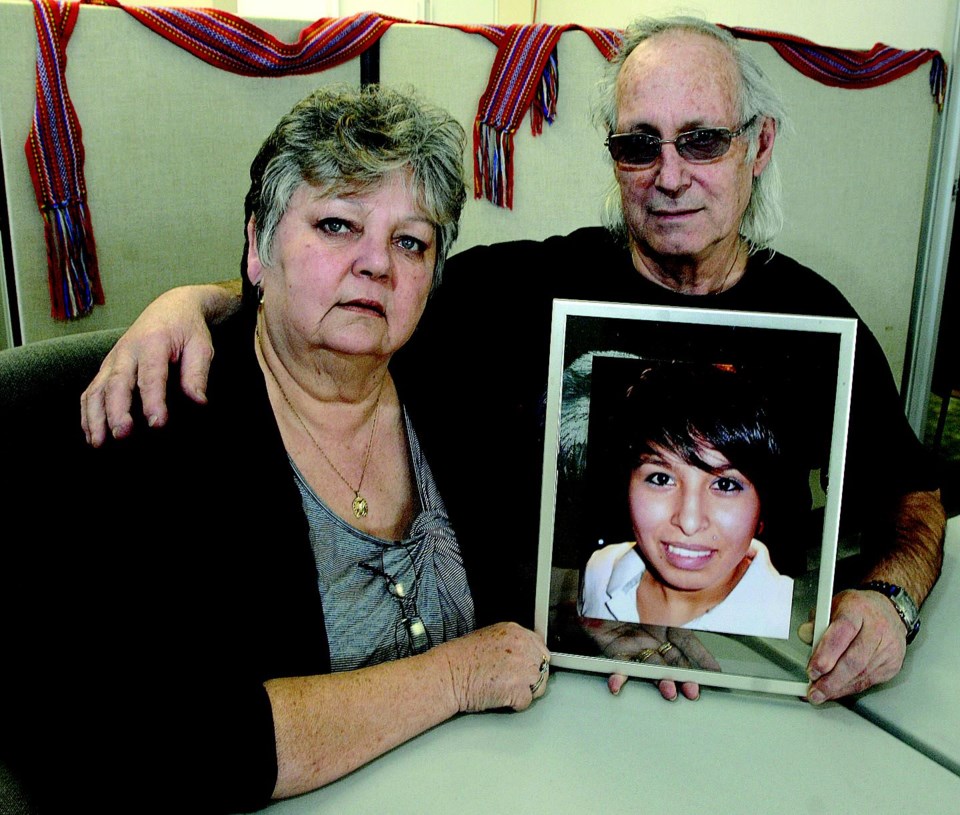Jackie Inyallie wanted to be a welder.
So on Nov. 21, 2009, having already earned her welding ticket, she left her home in Prince George to put her training to work at her first job in Dawson Creek.
It was a wet snowy day, highway conditions turned treacherous and just south of McLeod Lake, Inyallie collided with an oncoming vehicle, leaving the 24-year-old woman trapped in the vehicle with a punctured lung, broken ribs and a broken arm.
Coughing up blood, her arm was pinned in the wreckage, but Brad Russell of Prince George and his travel companion, who were among the first to stop at the scene, managed to pull her free. Another man arrived on the scene and used a satellite phone at about 2:30 p.m. to call for an ambulance. After three 9-1-1 calls, an ambulance was dispatched at 2:42 p.m.
The paramedic crew reached the scene at 3:40 p.m. and spent 33 minutes at the accident scene. While driving to Mackenzie hospital, Inyallie's condition worsened and the paramedic crew was forced to pull over to to try to save her life, but they were unsuccessful. She was dead by the time the ambulance arrived at the hospital, at 5:27 p.m., three hours after the accident.
The B.C. Coroner's Service has not yet released its autopsy report to Invallie's foster parents, Brian and Doreen Spence, more than two years after the accident. Doreen Spence has talked to the coroner several times and was told the delay in issuing the report was to allow investigators to conduct a medical inquest.
"We were asked to keep quiet while it went through their system and we didn't say anything, but now it's getting kind of long," Brian Spence said.
The Spences were led to believe Inyallie either died of a blood clot or drowned in her own blood. The B.C. Ambulance Service conducted an investigation into the incident but due to patient confidentiality policies is prevented from releasing details on Inyalie's emergency treatment.
"The weather on that particular day was very limiting, both for road conditions and the ability to fly and this incident occurred in remote location relative to where resources are," said Mike Michalko, the BCAS executive director for rural operations.
"Out at the scene there were challenges for us, particularly around communication with our dispatch centre. Given where towers are, and the location, and no cell service, like a lot of rural B.C. there are places where there is no communication."
Brian Spence was told by an RCMP officer that one of the police officers at the scene ended up driving the ambulance back to Mackenzie, but Michalko said he was not aware if that actually happened.
"The return trip to the hospital was under similar conditions and the crew did have to conduct patient care along the way," said Michalko. "An RCMP officer attended with us back to Mackenzie and I believe he was in the back assisting. It's not uncommon for us to garner the assistance of other first responder agencies."
Michalko said there were no recommendations made in the investigation the BCAS conducted and will await the findings of the coroner's inquest. The Citizen made a formal request to the cororner's office for the autopsy report on Feb. 2, but has still not received it.
In a Citizen story published a few days after the accident, Russell, who has first-aid training, told reporter Mark Nielsen the paramedic crew that day was ill-prepared for the accident, which Russell said resulted in delays that kept Inyallie from receiving medical treatment in hospital before she died.
"To me it seemed like it was a trainee paramedic and one who had just finished her training that was trying to figure out what to do," Russell said. "They spent more time trying to put on goggles and take goggles out of packages to put over their eyes than looking after this lady who was in a world of hurt."
The BCAS tries to pair its more experienced paramedics with one who has less training. Michalko said the two paramedics who attended the scene were new to the BCAS. Both were licensed as primary-care paramedics and had successfully completed the required training programs.
"These kind of incidents are very challenging; they will challenge a seasoned medic," Michalko said.
The Spences don't want to blame anyone for the events that led to Inyallie's death. But they do want improvements to the province's emergency medical system to increase the chances of saving people who suffer serious injuries in remote areas.
"She didn't have life-threatening injuries as a result of the accident, she died because it took so long," said Brian Spence. "I just want her death to not be in vain. She meant a lot to us and I want to see something done. What's a person's life worth?"


